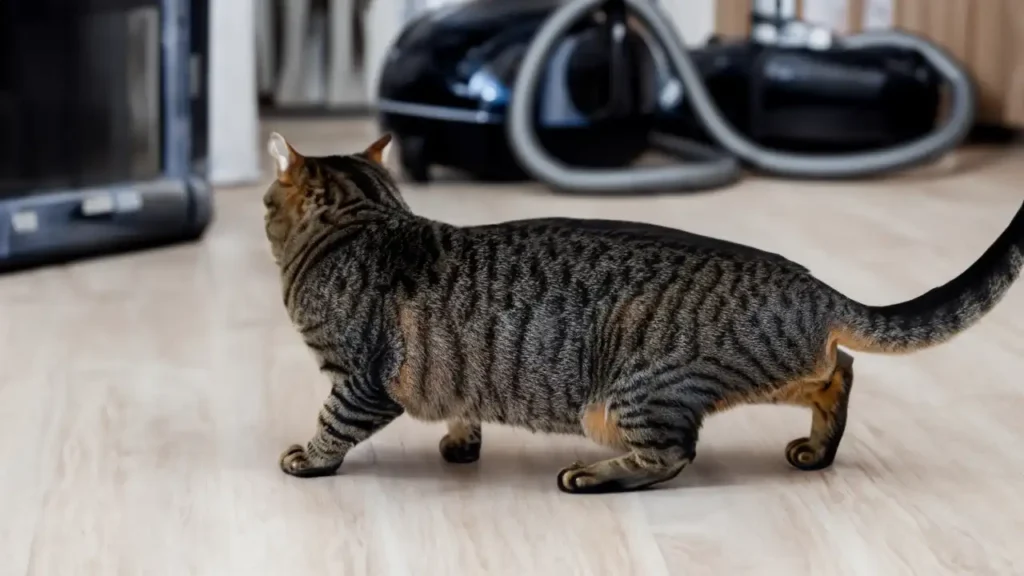Y’all cat owners know how it is – sometimes cats get scared by the strangest things! One minute they’re chillin’ on the couch, the next they’ve scrambled under the bed cuz a pillow moved or something. Cats can be such scaredy cats!
Let’s break down some of the main things that make cats freak out. If we understand what terrifies our feline buddies, hopefully, we can help them chill.
Table of Contents
Loud Noises

Cats have super sensitive hearing, so loud sounds really rattle them. Vacuum cleaners, thunder, construction noises – you name it. If it’s loud, it’s scary for kitty. Makes sense cuz, in nature, sudden loud noises could be a predator sneaking up. It’s best to run and hide just in case.
Some tips for loud noises:
Give the kitty advance warning if you’re gonna vacuum or do another noisy chore. Then they can hide where they feel safe.
Try a Thundershirt or pheromones to help with anxiety during storms.
Play calming music to help drown out the outside ruckus.
Sudden Movements
Anything zipping by unexpectedly will make cats jump. That’s why they hate it when you walk up behind them and surprise them. Or if you swoop down to pet them outta nowhere. They like to see things coming.
Go slow and announce yourself when approaching a scaredy cat. And don’t randomly swing your feet under the table – you’ll freak kitty out!
Other Animals
Do you know how cats puff up and act all crazy when they see another outdoor cat through the window? Strange animals stress them out. Even indoor pets like dogs can be scary if kitty are not used to them.
Introduce new pets slowly. Let them sniff each other under the door before fully meeting.
And keep those window curtains closed if neighborhood cats are causing late-night freak-outs!
Changes in Routine
Cats like things to be predictable. Any change to their normal routine can result in fear and anxiety. Like if you move their food dish or litter box location. Or if you go on vacation and leave them with a pet sitter.
When making changes, do it gradually over several days. And involve lots of calming treats and playtime to ease the transition!
Medical Procedures
Unfortunately, vet visits and medical procedures are straight-up traumatizing for many cats. All those strange smells, other animals, and being poked and prodded – no wonder they hate it!
See if your vet does in-home visits so the kitty can be examined in their safe space. There are also cat-only vets that are less stressful.
Ask about anti-anxiety meds to give before appointments. And be sure to comfort them with treats and cuddles afterward!
Car Rides
Unless they’re trained from kittenhood, most cats despise car travel. The motion, engine noise, and confinement in a carrier stress them to the max. There’s nothing worse than a cat freaking out in the car!
Try short practice drives before longer trips to get them used to it. Also, use feline-appealing pheromones and give them your worn T-shirt in the carrier so your scent is comforting.
Bathing
Few things terrify a cat more than being dunked into the water! Most cats spend bath time frantically trying to escape, claws out. It’s scary being wet and vulnerable and if you’re curious about why cats have such an extreme aversion to water, check out our article on ‘WHY DO CATS HATE WATER? DEMYSTIFYING THEIR EXTREME AVERSION“
Start young and go slowly if you want to bathe a cat without drama. Use calming treats beforehand. And never dunk their head or fully submerge them – gently wet with a damp cloth instead.
Unfamiliar Objects
Random objects that suddenly appear will make cats suspicious. Like if you get new furniture, or put packages and shopping bags on the floor. “What the heck is this thing??” thinks the startled cat.
Introduce new objects gradually, keeping them at a distance at first. And sprinkle them with treats or catnip so your cat associates them with good things, not fear.
Scary Scents
Cats don’t like weird smells in their space. Things like cleaning products, air fresheners, or even guests wearing strong perfume can be off-putting.
Try natural odor neutralizers like baking soda or vinegar instead of scented sprays. And ask guests to go light on the cologne before they visit.
A sensitive sniffer is both a blessing and a curse for our feline friends!
Tips for Helping Scaredy Cats
1. Give them a safe space. Scaredy Cats need a safe space. Make sure your cat has access to at least one hiding spot or high perch where they feel secure. Underbeds, deep closet shelves, and cat trees can all work. Place familiar bedding and toys there too.
2. Try calming pheromones. Synthetic pheromones like Feliway can help relax anxious cats. Plug-ins and sprays are available to use in their favorite lounging spots.
3. Consider supplements. Ask your vet about anti-anxiety supplements or medication for chronically scared cats. Things like chamomile, valerian root, and L-theanine can take the edge off.
4. Use positive reinforcement. When your cat confronts something scary but stands their ground, reward them with treats and praise. This builds their confidence.
5. Remain calm. Cats pick up on our emotions. If you get worried or angry, they think they should be too. Stay relaxed to reassure your cat all is well.
6. Be patient. It can take time for cats to overcome fears. Don’t scold them or force interactions that frighten them more. With time, rewards, and your calm presence, they can make progress.
FAQ
Q: Why are cats so easily scared compared to dogs?
A: As prey animals historically, cats evolved to be very sensitive to unexpected sights, sounds, and movements that could signal a threat. Their cautious nature helped them survive in the wild. Dogs evolved as predators so they are naturally less jumpy.
Q: Should I comfort my cat when they’re scared?
A: Yes, it’s important to comfort a frightened cat in a gentle, positive way. Talk softly, pet them lightly if they’ll allow it, and offer treats. Just don’t pick them up and force cuddling if they seem overwhelmed. Let them come to you.
Q: When should I call the vet about my scaredy cat?
A: If your cat is excessively fearful to the point that it’s impacting their daily functioning or quality of life, consult your vet. They can check for underlying medical issues and offer medication or supplements to help if needed.
Q: How can I cat-proof my home for a timid cat?
A: Make sure your cat has safe hiding spots in each room. Use shelves, cat trees, and cubbies so they can perch high. Keep plastic bags secured and balloons out of reach. Use ambient noise devices and keep things calm and predictable. Secure doors/windows and consider motion-sensor lights to alert you to intruders.
Q: What’s the best way to socialize a kitten who’s a Scaredy Cat and afraid of everything?
A: The critical socialization window is 7-14 weeks old. Expose kittens gently to a wide range of sounds, sights, smells, and people during this period. Offer praise and treats for confident behavior. Avoid scolding or forcing interactions. Build up their positive experiences slowly so they don’t become overwhelmed.
Q: How do I introduce a new person or pet without terrifying my scaredy cat?
Take it very slowly, ideally allowing the new individual to first swap scents via a swapped blanket. Provide high perches for your cat so they can observe from a safe distance. Have the person offer treats and play, but don’t force contact. Let your cat sniff and investigate in their own time. The individual should stay calm and avoid prolonged direct eye contact. If you’re interested in introducing your cat and dog and turning their relationship from wary to friends, check out our article on ‘FROM WARY TO FRIENDS: INTRODUCING YOUR CAT AND DOG‘


